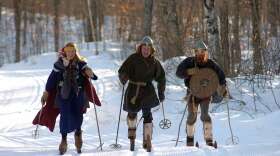NPR was a different place when Robert Siegel walked in the door for the first time in late 1976. For one thing, it was still commonly referred to by its full name. "I was utterly seduced by National Public Radio," Siegel says. "We didn't shrink from spelling it out in those days."
Siegel hangs up his headphones for the last time as host of All Things Considered on Friday, January 5th, ending a run of 30 years in the host's chair and more than 40 at NPR. That's about 38 more years than Siegel says he expected to spend at the network.
"When I moved down here, I saw it as a place that was good for about two years," Siegel explains. "I had left New York City when the radio station I worked for was sold - I figured it would take me a couple of years to work my way back to civilization."
But Siegel says he almost immediately found he had walked into someplace special, even though NPR's headquarters were a tiny fraction of their current size. "The three studios we had were, I think, the most beautiful radio studios I had ever seen," he recalls. "It was very well-equipped, it was full of lots of bearded people, and it was a place where people were actually trying to put the program on the air that we would listen to."
That, Siegel explains, made All Things Considered an outlier in the media landscape then - and sometimes now. "It's kind of fighting words to an audience researcher who would tell you, 'well, you're not reaching the right demographic'," Siegel says. "But I think the sincerity of the place was what struck me more than anything else, and the idealism of it - that we could actually do radio journalism the way we thought it should be done, not the way we figured you have to do it in a tough marketplace."
Learn more in a Special Series: Robert Siegel Retires From NPR
Siegel worked in a variety of capacities in his earliest days at NPR, including as an anchor and as an editor, before he moved to England to open and head the network's first London bureau, which was then located in the BBC's facilities. It paved the way for his work in remote corners of the world, but he remembers that in those days, doors weren't immediately open to him or his colleagues.
"We didn't have much of a reputation," Siegel says. "We had won awards for All Things Considered, but it was only with the launch of Morning Edition that the audience began to multiply as rapidly as it did.

"But when I would speak to ordinary people who I would meet in London, I would have to explain to them what this thing [NPR] was. And before I'd gone to London, most of the people we called up in the United States - for interviews or bookings - would not know what we were, exactly."
That, obviously, changed in the four-plus decades Siegel spent at the network. In that time, Siegel covered the fall of Communism in Eastern Europe, interviewed Presidents, and even appeared on "The Simpsons."
Today, though, he's savoring his last days as a full-time broadcast journalist, and doing what anyone does at the end of a long career - cleaning off a very full desk.
"I can't tell you the array of junk I've had on my desk all this time," he laughs. It's a desktop that includes everything from a "strange wood-shaved egg cup" that's adorned his office for a decade, to the coaster that has protected his desktop since he got it from an appearance at the Milwaukee Rotary Club in 1994. "My desk is a tribute to the random nature of life," he says.

Updated: WUWM has learned that Siegel has bequeathed his beloved Milwaukee Rotary Club coaster to NPR Congressional correspondent Scott Detrow. Detrow himself spoke to the Milwaukee Rotary Club in 2017, and is a graduate of Marquette University High School in Milwaukee.







